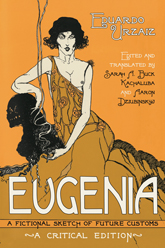Eugenia
A Fictional Sketch of Future Customs
A Critical Edition
Eduardo Urzaiz
Edited and translated by Sarah A. Buck Kachaluba and Aaron Dziubinskyj
Winner, Jose Toribio Medina Award, Seminar on the Acquisition of Latin American Library Materials
A little-known gem of utopian/dystopian fiction published in 1919 tells
the story of a eugenically engineered society of the future
It is the year 2218. In “Villautopia,” the capital of a Central American nation, the
state selects young, biologically desirable citizens to act as breeders. Embryos
are implanted in males to increase a flagging population rate, and the offspring
are raised in state facilities until old enough to choose their own, nonnuclear
families. Sterilization of children with mental or physical abnormalities further
ensures the purity of the gene pool.
Written two years before Yevgeny Zamyatin’s We and twelve years before
Aldous Huxley’s Brave New World, Eugenia recounts the story of Ernesto, who at
age twenty-three is selected as a breeder. Celiana, his thirty-eight-year-old lover
and an accomplished scholar, is deemed unfit for reproduction. To cope with
her feelings of guilt and hopelessness, she increasingly turns to marijuana, and
her scholarly productivity declines. Meanwhile Ernesto falls in love with a fellow
breeder, a young woman named Eugenia—but the life they ultimately choose is
not quite what the state had envisioned.
Taking up important challenges of modern society—population growth,
reproductive behavior and technologies, experimentation with gender roles,
and changes in family dynamics—Eugenia is published here in English for the
first time. Sarah A. Buck Kachaluba and Aaron Dziubinskyj provide a critical
apparatus helping readers to understand the novel’s literary genesis and genealogy
as well as its historical context. Arising from its twentieth-century origins, yet
remarkably contemporary, Eugenia is a treasure of speculative fiction.
Eduardo Urzaiz (1876–1955) was a Cuban-Mexican schoolteacher,
gynecologist, obstetrician, artist, and student of psychiatry.
 Sarah A. Buck Kachaluba is the Latin American Studies and Iberian Languages and Literatures Librarian at the University of California, San Diego, and has a PhD in Latin American history.
Sarah A. Buck Kachaluba is the Latin American Studies and Iberian Languages and Literatures Librarian at the University of California, San Diego, and has a PhD in Latin American history.
 Aaron Dziubinskyj is an associate professor
of modern languages at DePauw University. Aaron Dziubinskyj is an associate professor
of modern languages at DePauw University.
Praise
“A major contribution. Sarah A. Buck
Kachaluba and Aaron Dziubinskyj
have unearthed a powerful and
crucial work in the literary history
of Mexico, and they have created a
precise, effective translation and a
critical apparatus that encourages
readers to engage with the story
in novel and complex ways.”
—Cristina Rivera-Garza, author of
No One Will See Me Cry
“Gives scholarly and general audiences alike the chance to read an exceptional novel whose main theme, eugenics, still resonates today in our age of genetic engineering.”
—Journal of the Fantastic in the Arts
Publicity and Press Kit Resources
Click here for current & upcoming UW Press events
Download high resolution cover, color
Download high resolution cover, b/w
Download high resolution author photo, Sarah A. Buck Kachaluba, color
Download high resolution author photo, Sarah A. Buck Kachaluba, b/w
Download high resolution author photo, Aaron Dziubinskyj, color
Download high resolution author photo, Aaron Dziubinskyj, b/w
All images are at least 2.25 inches at 300 dpi wide; current title covers are a minimum of 1500 px wide/6 inches wide at 300 dpi. Please contact us if you need a custom size.
Media & bookseller inquiries regarding review copies, events, and interviews can be directed to the publicity department at publicity@uwpress.wisc.edu or (608) 263-0734. (If you want to examine a book for possible course use, please see our Course Books page. If you want to examine a book for possible rights licensing, please see Rights & Permissions.)
Of Related Interest
|

Level 7
Mordecai Roshwald, edited and with a new foreword by David Seed |
|

Larger images
February 2016
LC: 2015010204 PQ
248 pp. 6 x 9
8 b/w illus.
• Original Mexican edition: Talleres gráficos A. Manzanilla, 1919
|

